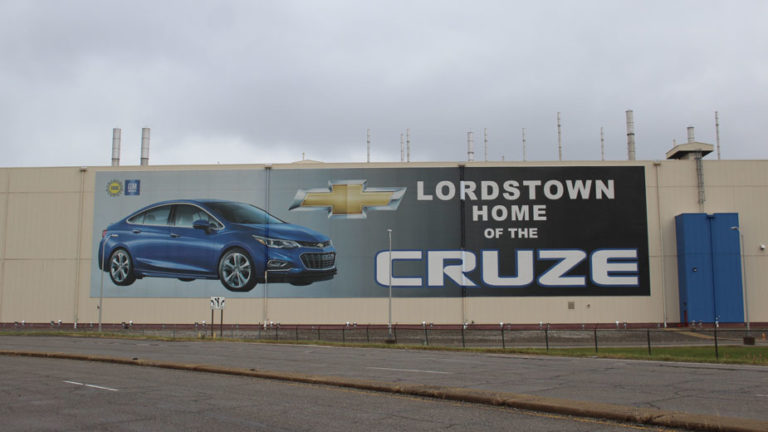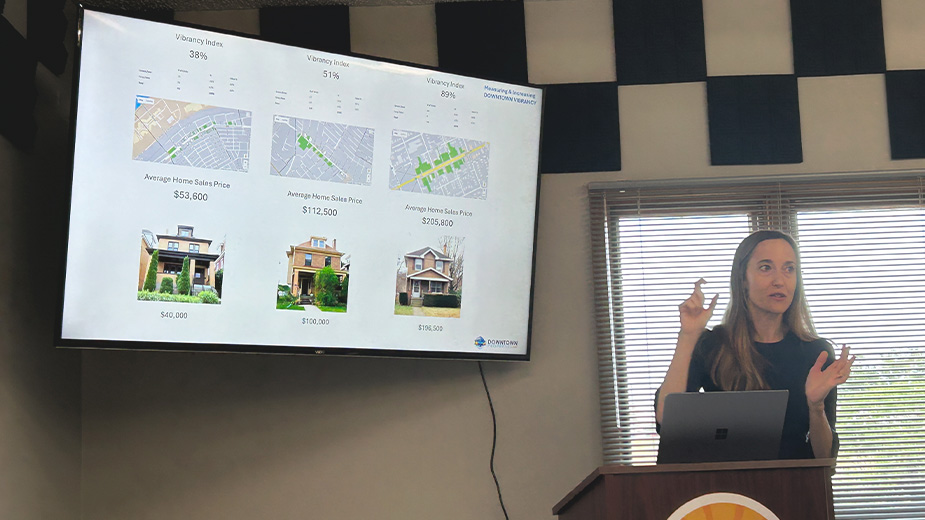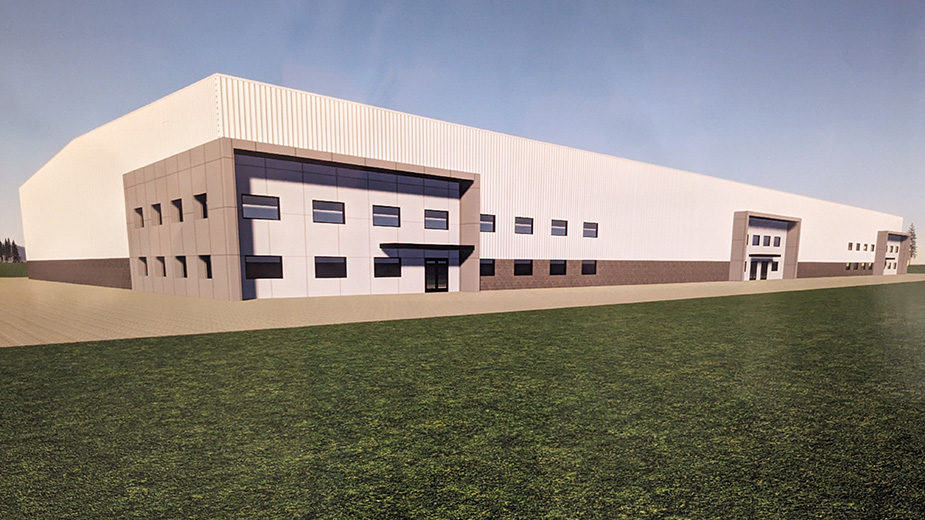Portman Warns Trump Against Retaliation; Strategy Planning Begins
YOUNGSTOWN, Ohio – U.S. Sen. Rob Portman argued against President Donald Trump’s threat Tuesday to revoke tax credits that benefit General Motors in retaliation for its decision to close several North American plants including its Lordstown Complex, and expressed concern that such a move would benefit Chinese competitors.
The Republican also told reporters during a conference call that the history of the plant and its workers, as much as any incentives that could be offered, will encourage GM to assign a new product at the Trumbull County plant, one of the plants which GM announced Monday would be “unallocated.” The plant manufactures the Chevrolet Cruze.
Portman, who had urged GM CEO Mary Barra to allocate a new product to the plant, said he was “discouraged” by the announcement and “disappointed” that GM had not “shown the kind of trust” that the plant’s workforce deserved, given what is has done for GM and their performance.
“We know, given the chance, we can compete with any plant in the country and have the same positive results for GM,” he said, and pledged to keep pushing for a new product for the plant. The workers, who in addition to producing a quality product took concessions to land the Cruze, deserve to be treated better, he said.
Portman’s conference call came toward the end of a day during which local, state and federal officials, business leaders and economic development specialists were assessing how best to pursue getting a new product and help the region cope with the expected loss of some 1,600 jobs at the plant, plus those employed at its suppliers in the region.
The call also followed Trump’s threat to cut all subsidies for GM, including for electric cars, an apparent reference to a $7,500 tax credit available to consumers who purchase electric vehicles.
“My concern about that is I don’t want to give Chinese companies an advantage,” as happened with Chinese steel, Portman said. China already has about half of the global market for electric vehicles, he warned. “I want to encourage innovation over here,” he added.
Portman acknowledged that he, Gov. John Kasich and his successor, state Attorney General Mike DeWine, are discussing state and federal incentives to encourage GM to reinvest in the Lordstown plant. And he supports the Drive It Home community support initiative launched last week by the United Auto Workers and the Youngstown/Warren Regional Chamber.
“There’s an opportunity here working together to put together a package to get them to make an investment in Lordstown,” Portman said. But he acknowledged that Barra has not specified any incentives GM might need.
Joshua Eck, a spokesman for DeWine’s transition team, confirmed that the governor-elect spoke with Portman, Kasich and representatives from JobsOhio, the state’s economic development arm, regarding the Lordstown plant. Although he could not provide details about those discussions, “Those jobs and families are very important” to DeWine, who will make his first trip as governor to the North American International Auto Show in Detroit in January “to give Ohio’s pitch in-person to industry officials.”
Portman dismissed assertions that tax code changes led to GM’s shutdown decisions, pointing out that the U.S. tax rate for companies is now 21%, compared with 30% in Mexico, and noted that companies investing in places like Lordstown can now write off 100% of their investment.
He added that Barra did not mention tariffs as a factor in the decision, and focused instead of the fact that the Cruze was no longer selling.
“My hope is that we’ll be able to convince General Motors that Lordstown is the right place for the future,” and for one of the 20 new electric vehicle models that GM has said it intends to produce within the next five years or other GM vehicles or parts, he said.
“There’s a small window of opportunity here with the de-allocation that there might be for further investment, whether it’s in a new product line or one of the emerging technologies that GM is going after,” affirmed James Dignan, president and CEO of the Regional Chamber. The automaker says its future focus is on electric and autonomous vehicles.
A strategy session is being planned for later this week to assess the impact of GM’s plans to discontinue production of the Cruze and to develop a coordinated response, Dignan reported.
Participants in the meeting are expected to include representatives of four of the Mahoning Valley’s major players in economic development – the Regional Chamber, Western Reserve Port Authority, Eastgate Regional Council of Governments and Mahoning Valley Economic Development Corp.
The goal of the meeting is “to develop an action plan,” said Jim Kinnick, Eastgate’s executive director.
“We don’t want to have a scattered response. We want to be unified in our efforts as we move forward and have a unified voice,” he added.
At the Regional Chamber, much of the activity Tuesday was centered around making sure “everyone involved here locally and in the state is on the same page,” Dignan said.
Dignan is working with Team NEO and its CEO, Bill Koehler, to come up with a “comprehensive plan and strategy to open a dialogue about future expansion or retention” at Lordstown. Among the possibilities being discussed is combining GM’s interest in autonomous technology – Ohio has its DriveOhio program focusing on driverless technology – with local expertise in advanced manufacturing technologies such as additive manufacturing to attract investment by GM, he said.
Team NEO’s Koehler said given the workforce needs in the region, part of his organization’s role is to make known the expertise displaced GM workers have and help connect those employers with that human capital. “If we can make those connections, we can have value,” he said.
In addition, Team NEO supports efforts by its partners in the Mahoning Valley to broaden the economy and strengthen the overall competitiveness of the industries here. For example, it played an early role in efforts to secure the regional distribution center TJX Companies plans to build in Lordstown.
TJX is expected to create 1,000 jobs, short of the 1,600 still employed at GM Lordstown, and those jobs will “no doubt” pay much less, noted A.J. Sumell, economics professor at Youngstown State University.
“It’ll help soften the blow, but it’s still going to be a pretty significant blow,” he said.
The regional economy already is more diversified and less reliant on manufacturing, Sumell added.
At its peak, manufacturing represented 40% of employment locally. Today it represents just over 10% of the workforce, “a significant decrease from 40 years ago,” he said. Sectors such as education, health, professional and business services, mining and construction now represent larger shares of the workforce.
The overall workforce in the Mahoning Valley has declined by about 1% annually on average over the past 20 years, Sumell pointed out. “So in terms of composition of workers that remain, we have a more diversified economy, which makes us less susceptible to future recessions and any single plant closing,” he said.
One of the other elements expected to come out of local planning is entrepreneurship – providing opportunities for dislocated workers who might already have a side business or who want to explore new opportunities.
“It’s not going to be the solution for everybody but we want to give everybody all their options,” said Genna Petrolla, economic development planner with Eastgate.
Years ago, the Ohio Small Business Development Center at Youngstown State University offered educational programs at GM Lordstown for plant employees taking early retirement or buyouts who are thinking about starting a business, recalled Patricia Veisz, director of the center.
Hopefully GM will put together a similar package to provide entrepreneurship training or job retraining for workers, she said. Depending on the severance package they get, those displaced workers will have a cushion of income to support them and their families while they launch their new ventures.
“There are a lot of resources in the area to help,” Veisz said.
U.S. Rep. Bill Johnson, R-6 Ohio, wants to capitalize on the potential availability of the GM Lordstown Complex building and its workforce. He sent a letter yesterday to the heads of 11 automobile manufacturers outlining the tremendous opportunity GM competitors now have in the region.
“The site in Lordstown is a ready-made facility in an excellent location along the Ohio Turnpike. This is a hardworking, blue-collar community with a rich manufacturing tradition, with a willing, trained, and ready workforce,” Johnson wrote. “If a competitor decides to invest in the Mahoning Valley, they will learn what I already know – quality work and manufacturing is in the DNA of the men and women here.”
COMPREHENSIVE COVERAGE:
GM to Close Lordstown Plant In March
Inside Union Hall, GM Announcement ‘A shot in the Gut’
Amid GM Fallout, Leaders Focus on Next Steps
Workers Face Uncertainty After GM Decision
Chevy Dealers Not Surprised by Cruze Cancellation
Brown Calls GM Decision ‘Corporate Greed’
Ryan on Plant Closing: ‘New Black Monday’
Read Full Text of GM Closings Announcement
Ryan Wants Congressional Hearing on GM Tax Windfall
Contract Talks Will Decide Plants Fate, UAW Says
Portman Warns Trump Against Retaliation; Strategy Planning Begins
Youngstown Leaders Consider a Future with or without GM
Brown to Speak with Trump Regarding GM
Prayer Vigil Today, Planning Tomorrow to Support Plant
WATCH VIDEO:
Leaders React to Lordstown Closing
‘3 Minutes With’ Greg Greenwood, Chevrolet dealer
‘3 Minutes With’ Dave Green, UAW Local 1112 president
Copyright 2024 The Business Journal, Youngstown, Ohio.



